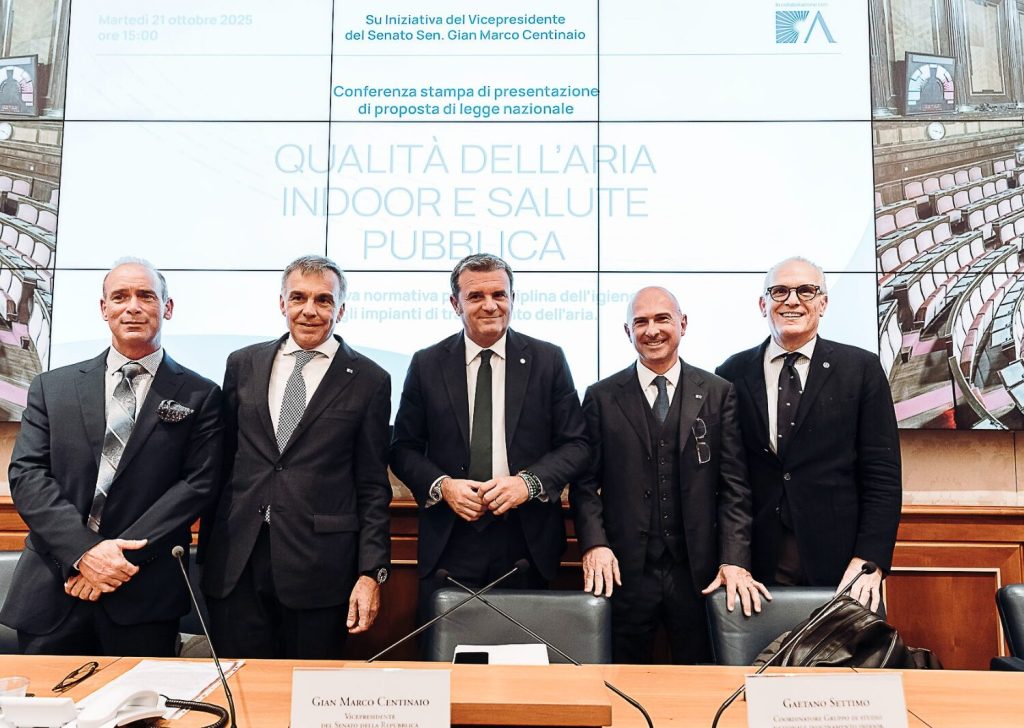On October 21, the press conference was held in Rome, at the Senate of the Republic – Sala Caduti di Nassirya, promoted by Senator Gian Marco Centinaio to present a proposal dedicated to the hygiene of air treatment plants in indoor environments.
To moderate the work, journalist Mattia Iovane (RAI, Il Mattino).
The initiative was born in response to a topic of increasing urgency: the quality of the air we breathe within the closed environments, where we spend more than 90% of our time. A central aspect for public health and national economy, as evidenced by the data of the Observatory on the Quality of Indoor Air (Milan-Bicocca University and Bocconi University), according to which the economic impact of indoor pollution can affect up to 5.22% of Italian GDP.
“The quality of the air is fundamental, not only the outdoor one – so what we breathe when we are on the street – but also the indoor one, when we are at home, at work, on holiday or at the supermarket. Our task as institutions is to ensure adequate standards, so that those who work on air quality – and therefore on our health – can operate in the best possible way”, said the Vice President of the Centinaio Senate, who then reiterated the importance of the support of local authorities: “We must ensure that they can be supportive of innovation, scientific research and the possibility of improving. The bureaucracy must do its part, because it continues to be one of the unresolved problems of our country”.
For Gregorio Mangano, President of AIISA and CEO of Techno One: “We do not see what we breathe, nor the pollutants present, especially those that are nested inside the air treatment plants. Today I have brought some photos, as I often do, because you are not aware of what we breathe daily. Showing these images awakens consciences and helps to understand the severity of the problem, which involves high social costs and, unfortunately, also a significant number of deaths every year.”.
The aim is to achieve a bill introducing an innovative regulatory framework, based on prevention, planned maintenance, periodic checks and certified vocational training. All without additional charges for the state, but through a rationalization of the resources already available. Work on the text has already been started.
As explained by Andrea Casa, President Emeritus of AIISA and CEO of Alisea: “The regulatory framework in Italy is very complex and must be simplified, starting from a high level of the sources of law, therefore from a state law. This proposal aims to give a more rational framework to the subject: does not focus on sanctions, but aims to create awareness and sensitivity towards the quality of the air we breathe.”.
Gaetano Settimo, Coordinator of the National Study Group Indoor Pollution (ISS), underlined: “The theme of indoor air is crucial to our health. We spend most of the time in closed environments, and right there we must start preventive actions, because it is where the health of the population is built. Indoor air quality is also a lever for the competitiveness of production processes and for the effectiveness of our National Health Service. Primary prevention not only reduces comorbidity, but helps lower health costs. To have indoors is to care for public health.”.
In connection, Susanna Dorigoni, Head of the Indoor Air Quality Observatory – Bocconi University and Bicocca University, explained the social costs of indoor pollution (indoor air quality – IAQ), equal to a significant share of GDP. These costs, it has emphasized, can become benefits for society and for enterprises that operate in shared environments or that produce and maintain HVAC technologies.
“In the face of the new policy in the by definition – said Dorigoni – it is necessary to continue the research activity to design an effective regulation, able to guarantee minimum standards of air quality in all indoor environments for civil use and to increase social well-being. Responsible companies must seize the opportunity offered by an institutional, regulatory and economic context increasingly oriented to sustainability (ESG policies), avoiding that this is only translated into a burden of costs”.
The key elements to be included in the proposal are: targeted controls and periodic inspections on air treatment plants, with obligation to sanitize when necessary; standardized and verifiable procedures, based on scientifically validated methods; training of qualified personnel, with certified regional lists; effective monitoring system, which includes document and technical checks in case of reports.
The expected benefits, however, concern public health, understood as a reduction in respiratory diseases and nosocomial infections; economic efficiency, considering health savings and the development of new professional skills and normative clarity, therefore less bureaucracy for enterprises and public administrations.
The text of the proposal will be consulted with experts, industry associations and health institutions, with the aim of starting the parliamentary process in the coming months.
Article The Senate presented a proposal for indoor air quality: public health, prevention and rationalization at the heart of the initiative comes from IlNewyorkese.

